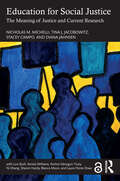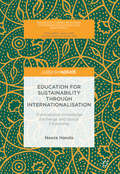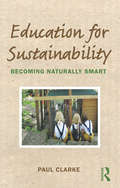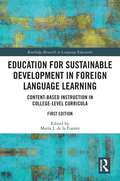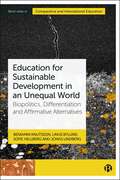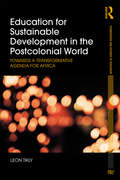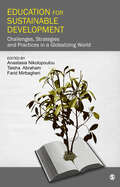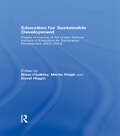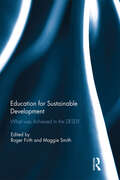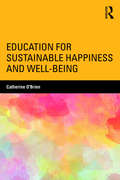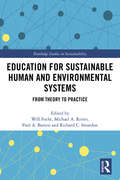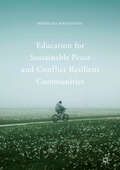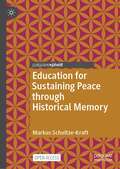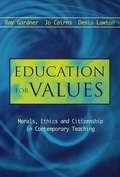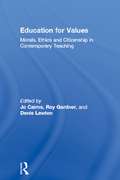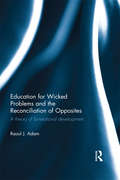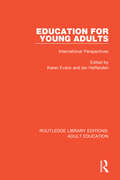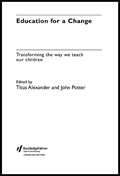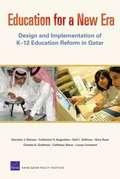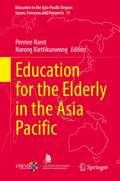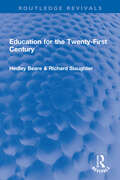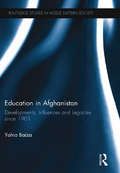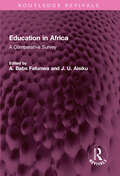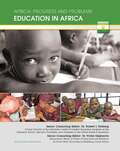- Table View
- List View
Education for Social Justice: The Meaning of Justice and Current Research
by Nicholas M. Michelli Tina J. Jacobowitz Stacey Campo Diana JahnsenEducation for Social Justice is a statement of the role of education in promoting social justice. Drawing on research, this book explains what social justice is, presents the argument that democracy requires a commitment to social justice, and shows what action steps need to be taken to ensure social justice is achieved within education and society more broadly. The text presents research and concrete examples to examine the social justice issues facing society today. Some of the social justice topics explored include access to higher education, informal education (such as museums and art galleries) and adequate civic education, and racial and gender discrimination within education, as well as access to healthcare and the vote, which impact students’ learning. It explores specific research and action for each of these elements and, at the end of the book, provides potential paths forward to improve social justice outcomes. This timely book encourages readers to consider what we can do to enhance social justice in education and society. It is important reading for pre-service teachers, particularly those studying teaching for social justice, social studies education, and educational policy and politics, as well as for in-service teachers who want to make a difference.
Education for Social Justice: The Meaning of Justice and Current Research
by Nicholas M. Michelli Tina J. Jacobowitz Stacey Campo Diana JahnsenEducation for Social Justice is a statement of the role of education in promoting social justice. Drawing on research, this book explains what social justice is, presents the argument that democracy requires a commitment to social justice, and shows what action steps need to be taken to ensure social justice is achieved within education and society more broadly. The text presents research and concrete examples to examine the social justice issues facing society today. Some of the social justice topics explored include access to higher education, informal education (such as museums and art galleries) and adequate civic education, and racial and gender discrimination within education, as well as access to healthcare and the vote, which impact students’ learning. It explores specific research and action for each of these elements and, at the end of the book, provides potential paths forward to improve social justice outcomes. This timely book encourages readers to consider what we can do to enhance social justice in education and society. It is important reading for pre-service teachers, particularly those studying teaching for social justice, social studies education, and educational policy and politics, as well as for in-service teachers who want to make a difference.
Education for Sustainability through Internationalisation: Transnational Knowledge Exchange And Global Citizenship (Palgrave Studies In Global Citizenship Education And Democracy Ser.)
by Neera HandaThis book suggests how the internationalisation of teaching and learning for sustainability can be a vehicle for a two-way flow of knowledge across national, cultural and theoretical boundaries. Establishing links between the internationalisation of education and the ideal of global sustainability, the author presents innovative alternative solutions to address the pressing social, environmental and ethical problems of our age, a global priority demanding an educational response. By engaging with the Hindi concept of tri-vid, the three-in-one unification of knowledge, the author reassesses the very nature of knowledge through the intellectual agency of both students and educators. Once opportunities for alternatives not available in dominant Western knowledge traditions are recognised, the development of an innovative alternative perspective becomes possible. This pioneering book will be of interest to students and scholars of international education, sustainability education and globalisation.
Education for Sustainability: Becoming Naturally Smart
by Paul ClarkeIn this book, Paul Clarke argues that in order to live sustainably we need to learn how to live and flourish in our environment in a manner that uses finite resources with ecologically informed discretion. Education is perfectly placed to create the conditions for innovative and imaginative solutions and to provide the formulas that ensure that everyone becomes naturally smart; but to achieve this, we need to recognise that an education that is not grounded in a full understanding of our relationship with the natural world is no education at all. In other words, a total transformation of schools and schooling is needed. While acknowledging that the ecological crisis is global in scale, Paul Clarke maintains that many of the solutions are already evident in our local communities. Drawing on innovative sustainable living programmes from around the world, including Sweden’s Forest Schools, China’s Green Schools programme, the US Green Ribbon Schools programme and his own school-of-sustainability project, Paul Clarke offers practical solutions about how schools and communities can make their contribution. This book examines how we might proceed to empower and actively develop schools and communities to connect hand, heart and mind for an eco-literate future. It is thought provoking, timely and challenging, and should be read by school leaders, community and business leaders, as well as anyone grappling with the problems of transition from an industrial past to an ecologically sustainable future.
Education for Sustainable Development in Foreign Language Learning: Content-Based Instruction in College-Level Curricula (Routledge Research in Language Education)
by María J. de la FuenteThis unique volume utilizes the UNESCO Education for Sustainable Development (ESD) framework to illustrate successful integration of sustainability education in post-secondary foreign language (FL) learning. Showcasing a variety of approaches to using content-based instruction (CBI) in college-level courses, this text valuably demonstrates how topics relating to environmental, social, and cultural dimensions of sustainability can be integrated in FL curricula. Chapters draw on case studies from colleges throughout the US and consider theoretical and practical concerns relating to models of sustainability-based teaching and learning. Chapters present examples of project-, problem-, and task-based approaches, as well as field work, debate, and reflective pedagogies to enhance students’ awareness and engagement with sustainable development issues as they acquire a foreign language. Insights and recommendations apply across languages and highlight the potential contribution of FL learning to promote sustainability literacy amongst learners. This text will benefit researchers, academics, and educators in higher education with an interest in Modern Foreign Languages, sustainability education, training, and leadership more broadly.
Education for Sustainable Development in an Unequal World: Biopolitics, Differentiation and Affirmative Alternatives (Bristol Studies in Comparative and International Education)
by Sofie Hellberg Jonas Lindberg Beniamin Knutsson Linus BylundEducation for Sustainable Development (ESD) is recurrently depicted as an enterprise that unites humanity in a common pursuit of a more just and sustainable world. But how is this enterprise pursued on a planet that is enormously unequal? Drawing on biopolitical theory and rich empirical data from different contexts around the world, this book explores how ESD is unpacked depending on whether people are rich or poor. The book demonstrates how ESD is adapted to the lifestyles and living conditions of different populations. The implication of this depoliticized sensitivity to local ‘realities’, the book argues, is that inequality becomes accommodated and that different responsibilities are assigned to rich and poor. Ultimately, the book considers alternatives to this biopolitical divide.
Education for Sustainable Development in the Postcolonial World: Towards a Transformative Agenda for Africa (Foundations and Futures of Education)
by Leon TiklyEducation for Sustainable Development (ESD) lies at the heart of global, regional and national policy agendas, with the goal of achieving socially and environmentally just development through the provision of inclusive, equitable quality education for all. Realising this potential on the African continent, however, calls for radical transformation of policy and practice. Developing a transformative agenda requires taking account of the ‘learning crisis’ in schools, the inequitable access to a good quality education, the historical role of education and training in supporting unsustainable development, and the enormous challenges involved in complex system change. In the African continent, sustainable development entails eradicating poverty and inequality, supporting economically sustainable livelihoods within planetary boundaries, and averting environmental catastrophe, as well as dealing with health pandemics and security threats. In addressing these challenges, the book: explores the meaning of ESD for Africa in the context of the ‘postcolonial condition’ critically discusses the Sustainable Development Goals (SDGs) as well as regional development agendas draws on a wealth of research evidence and examples from across the continent engages with contemporary debates about the skills, competencies and capabilities required for sustainable development, including decolonising the curriculum and transforming teaching and learning relationships sets out a transformative agenda for policy-makers, practitioners, NGOs, social movements and other stakeholders based on principles of social and environmental justice. Education for Sustainable Development in the Postcolonial World is an essential read for anyone with an interest in education and socially and environmentally just development in Africa.
Education for Sustainable Development: Challenges, Strategies and Practices in a Globalizing World
by Anastasia Nikolopoulou Taisha Abraham Farid MirbagheriEducation for Sustainable Development is an emerging field that is being addressed from transdisciplinary and transinstitutional perspectives, forging links between academic and non-academic institutions. It explores sustainable development as a process that embraces environmental issues, poverty, health, security, democracy, gender and human rights. This collection provides multiple perspectives regarding the possibility of creating sustainable education practices that are integrated into and relevant to the needs and practices on a global scale. It also focuses on the failure of traditional education to address the problems of globalization. The articles conceive sustainable development education as focusing on the holistic development of the body and mind, encompassing a wide range of issues. This idea is also central to the Gandhian tradition of life knowledge and Nai Talim (New Education). The uniqueness of this compilation is in the multiple perspectives it provides, establishing workable links between local communities, governments and international organizations that would enable sustainable human development. It is a rich reference resource for those working in the fields of education, economics and development studies.
Education for Sustainable Development: Papers In Honour Of The United Nations Decade Of Education For Sustainable Development (2005-2014)
by David Higgitt Martin Haigh Brian ChalkleyIn 2005, The United Nations launched its Decade of Education for Sustainable Development, which recognises that education, including Higher Education is the key to the change in social attitudes that will be needed to protect the welfare of future generations. This involves helping learners to live as though the future matters and to achieve ecoliteracy. This includes the understanding that personal lifestyle decisions may have consequences, ranging from climate change, through loss of biodiversity, to pollution and resource depletion that may permit environmental degradation on a planetary scale. It also involves helping them to develop the skills needed to cope with such challenges. This international collection of research papers and position statements from special issues of the Journal of Geography in Higher Education and Applied Environmental Education and Communication, written by many of the leading practitioners in the field, aims to provide resources and practical guidance for all seeking to promote and engage in education for a sustainable future. Rabindranath Tagore encouraged each learner to make their actions demonstrate a harmonious union between education and environment. David Orr argued that the world needs people who live well in their places to make the world both habitable and humane and that the main challenge for education is to help learners make their minds fit for life on Earth. This book tries to chart a practical route towards these objectives. This book was previously published as special issues of the Journal of Geography in Higher Education and Applied Environmental Education and Communication
Education for Sustainable Development: What was achieved in the DESD?
by Maggie Smith Roger FirthTo integrate the principles, values, and practices of sustainable development into all aspects of education and learning was the overarching goal of the UN Decade of Education for Sustainable Development (2005-2014). This, it was believed, would ‘save the planet’, encouraging behaviour changes to allow for the development of a more sustainable and just society for all. Awareness of sustainable development has risen enormously in recent years, challenging us, as individuals and as families, workplaces, and communities (both local and global), to think about and act upon the major issue which we face. The Decade reaffirmed the United Nations’ commitment to the crucial role of education and learning in the pursuit of sustainable development, and the need for far-reaching changes in the way education is often practised. Of course, the very idea that education should be for something (whether sustainable development or anything else), remains as questionable as ever. Nevertheless the instigation of the Decade clearly recognised the need for intensified efforts to achieve sustainable development. This book reflects on the role and impact of the Decade in helping to reorient education towards sustainability, and looks forward, beyond the end of the Decade and its achievements, to contemplate the way ahead, giving special attention to case studies and the state of affairs in England. The authors offer different perspectives on the effectiveness and value of particular initiatives and practices that are responses to the Decade. This book was originally published as a special issue of The Curriculum Journal.
Education for Sustainable Happiness and Well-Being
by Catherine O'BrienIn this innovative and cogent presentation of her concept of sustainable happiness, Catherine O’Brien outlines how the leading recommendations for transforming education can be integrated within a vision of well-being for all. Solution-focused, the book demonstrates how aspects of this vision are already being realized, and the potential for accelerating education transitions that enable people and ecosystems to flourish. Each chapter assists educators to understand how to apply the lessons learned, both personally and professionally. The aim is to support educators to experience themselves as change-makers with growing confidence to implement new teaching strategies and inspire their students to become change-makers as well—engaged in deep learning that develops character, connections with life, and invigorating collaborations that revitalize the very purpose of education.
Education for Sustainable Human and Environmental Systems: From Theory to Practice (Routledge Studies in Sustainability)
by Will Focht Michael A. Reiter Paul A. Barresi Richard C. SmardonThe goal of Sustainable Human and Environmental Systems (SHES) education is to prepare students to facilitate social learning in communities that builds knowledge of, capacity for, and commitment to sustainability to facilitate the emergence of sustainable societies. The SHES approach to sustainability education relies on complexity-based systems thinking that transcends disciplinary boundaries. This book provides a comprehensive guide to the SHES approach, including its rationale and theoretical foundation, its pedagogy and practical applications in curricula, and ways to support the approach through institutional administration. This book will be of great interest to academics and students of education, environmental sciences and studies, sustainability and sustainable development, natural resource management, conservation, environmental policy, environmental planning, and related fields in higher education. Educators can use this book as a guide to SHES pedagogy, curriculum design, sustainability, environmental studies, sustainable development, and sustainable well-being. Administrators will find the book useful in establishing, evaluating, staffing, and promoting programs based on the SHES approach.
Education for Sustainable Peace and Conflict Resilient Communities
by Borislava ManojlovicThis book articulates a practice and theory of education that aims to facilitate the emergence of sustainable peace and conflict-resilient communities in societies plagued by conflict. It does so by examining the agency of conflict-resilient communities and the dynamic processes of their interactions with larger societal structure. Although education is seen as a human right, the design of education policies, schooling models and curricula has primarily been the prerogative of elites, be they governments, academics or international actors. This book argues for a different approach to education, contending for more inclusivity and open deliberation in modeling education frameworks. Drawing on case studies and interviews with practitioners, scholars, activists, and policymakers, it applies the lenses of conflict resolution to a variety of education issues within fragile societies.
Education for Sustaining Peace through Historical Memory (Memory Politics and Transitional Justice)
by Markus Schultze-KraftInformed by the author’s long-standing work on violent conflict, peace and education in countries of the Global South, particularly Colombia, this open access book presents a comprehensive narrative about the relationship between peace education, historical memory and the sustaining peace agenda, advocating for the adoption of a new perspective on education for sustaining peace through historical memory. Education on and for peace in countries wrestling with, or emerging from, protracted violent conflict is up against major challenges, and both conventional and critical approaches to peace education are limited to address these. Incorporating a focus on historical memory, without losing sight of its own pitfalls, into peace education can support learners and teachers to come to grips with achieving positive, peace-sustaining change at both the micro (individual) and macro (social and institutional) levels, and to develop concepts and practices of effective and legitimate alternatives to violence and war. Conceived in these terms, historical memory-oriented peace education also stands to enhance the work-in-progress that is the UN-led sustaining peace agenda, including its Sustainable Development Goals.
Education for Values: Morals, Ethics And Citizenship In Contemporary Teaching
by Roy Gardner Jo Cairns Denis LawtonValues in education, in terms of both how they are taught and of the ethics of teaching itself, are an area of lively debate. This text provides a resource of ideas, issues and practice for all those with an interest in this area of education.
Education for Values: Morals, Ethics and Citizenship in Contemporary Teaching
by Roy Gardner Jo Cairns Denis LawtonValues in education - how they are taught, the ethics of teaching itself, plus their role in the education of educators - is an area of lively and passionate debate. This book provides an essential resource of ideas, issues and current practice for all those with an interest in this area of education. Presenting a range of critical writing, this book deals with issues relating to education in values; approaches to teaching values; teacher education and values; research for education in values; and international comparative studies. Highly regarded when it was first published in hardback in 2000, the book now appears in paperback for the first time with a new introduction, which updates the main ideas and themes of the book.
Education for Wicked Problems and the Reconciliation of Opposites: A theory of bi-relational development
by Raoul J. AdamThe recognition and reconciliation of ‘opposites’ lies at the heart of our most personal and global problems and is arguably one of the most neglected developmental tasks of Western education. Such problems are ‘wicked’ in the sense that they involve real-life decisions that have to be made in rapidly changing contexts involving irreducible tensions and paradoxes. By exploring our human tendency to bifurcate the universe, Education for Wicked Problems & the Reconciliation of Opposites proposes a way to recognise and (re)solve some of our most wicked problems. Applying an original theory of bi-relational development to wicked problems, Adam proposes that our everyday ways of knowing and being can be powerfully located and understood in terms of the creation, emergence, opposition, convergence, collapse and trans-position of dyadic constituents such as nature/culture, conservative/liberal and spirit/matter. He uses this approach to frame key debates in and across domains of knowledge and to offer new perspectives on three of the most profound and related problems of the twenty-first century: globalisation, sustainability and secularisation. This book is a comprehensive study of dyads and dyadic relationships and provides a multidisciplinary and original approach to human development in the face of wicked problems. It will be of great interest to students and academics in education and psychosocial development as well as professionals across a range of fields looking for new ways to recognise and (re)solve the wicked problems that characterise their professions.
Education for Young Adults: International Perspectives (Routledge Library Editions: Adult Education)
by Karen Evans Ian HaffendenOriginally published in 1991, this book gives international coverage of opportunities in youth development and education from a unique comparative angle. The book is split into two parts: the first focusses on the former USSR, Europe and North America, setting the issues within the wider context of the political debate of the superpowers. The second part looks at newly developing countries and their relationship with the developed world. There is a broad variety of case studies, including material on Chile, Botswana and the Seychelles - areas which are often overlooked.
Education for a Change: Transforming the Way We Teach our Children
by John Potter Titus AlexanderThis challenging, hard-hitting book is about making schooling relevant to modern society. It starts from the premise that our present education system is ill equipped to serve students and society in the twenty-first century. In a series of positive yet powerful and provocative chapters, the authors look at critical issues shaping schools today, with a view to: * set out the critical issues behind the headlines* show evidence from research and examples of good practice* stimulate public debate and rigorous thinking about how we educate children for life in the twenty-first century* provide practical examples of learning for the future* present a vision for school transformation. With contributions from a range of leading commentators including Tim Brighouse, Jonathan Poritt, Anita Roddick, Charles Handy and Jonathan Sacks, this is a must-read for school leaders, teachers, policy-makers, parents and all education professionals.
Education for a New Era: Design and Implementation of K-12 Education Reform in Qatar
by Gail L. Zellman Catherine H. Augustine Charles A. Goldman Gery W. Ryan Gery Ryan Dominic J. BrewerDescribes the first phase (2001-2004) of Qatar's bold K-12 education reform initiative, Education for a New Era, based on RAND's experiences as part of this ambitious, multi-participant effort. RAND examined the existing Qatari education system, recommended options for building a world-class system, and supported implementation of the chosen option, which is based on internationally benchmarked curriculum standards and parental choice of schools.
Education for the Elderly in the Asia Pacific (Education in the Asia-Pacific Region: Issues, Concerns and Prospects #59)
by Pennee Narot Narong KiettikunwongIn many countries across the Asia Pacific region, people are adapting to the new demographic shift, but there is nonetheless much concern. This book documents the various educational approaches rendered by both public and private sectors to enable elderly individuals in their own countries to re-engage in society more inclusively, to stay longer in the labour market, and to become less dependent on the state or their families. In order to produce active, healthy, and productive aging citizens, the experiments showcased by this book highlight how adaptive action is needed across many policy areas, with emphasis on shaping structural differences in the composition and organisation of higher education systems that can better foster lifelong learning among elderly citizens. The book is a great venue to underline the interplay of the theory and practices of vastly complex challenges.
Education for the Twenty-First Century (Routledge Revivals)
by Hedley Beare Richard SlaughterFirst published in 1993, Education for the Twenty-First Century grew out of a common and deep-seated concern about the way young people think of their own future, and about some of the relatively simplistic education reforms advocated, often by people with scant comprehension of modern educational practices. Schools as institutions, schooling patterns, the curriculum and teachers themselves have come under heavy criticism, but it has to be recognized that the problems in education have no lasting or satisfactory solutions while schools continue to operate out of the framework which has determined their raison d’être for the past two hundred years. The authors argue that schools do not need fine tuning, or more of the same; rather some of the fundamental assumptions about schooling have to be revised. They argue that learning about the future must become very much a part of the present, and they set out in the book some of the thinking and several techniques which permit us to confront the future and make it a more friendly place. The book will be of interest to students, teachers and policymakers.
Education in Afghanistan: Developments, Influences and Legacies Since 1901 (Routledge Studies in Middle Eastern Society)
by Yahia BaizaA comprehensive and up to date study of the history of education in Afghanistan since 1901, this book demonstrates how modern education emerged and charts its fluctuating process of development, regression and destruction. Combining historical and contemporary analysis of key international and national, political, and historical issues from the late nineteenth century to the present day, Education in Afghanistan examines; religion, modernism, tribal and ethnic conflict, language discrimination, foreign invasions, war, and international assistance through the lens of education. An in-depth understanding of these elements will provide alternative approaches to addressing the on-going conflict in Afghanistan, which has a direct effect on the overall educational development and policy-making decisions in the country. Offering a new perspective to the conflict in Afghanistan by addressing its impact on education, this book will be an invaluable resource for students and researchers interested in the formation of education policy, social and political reform in the Middle East, and Islamic Studies.
Education in Africa: A Comparative Survey (Routledge Revivals)
by A. Babs Fafunwa; J. U. AisikuFirst published in 1982, Education in Africa offers a comprehensive treatment of the development of education in Africa. Until now only scattered documents on educational growth in individual countries have been available; works devoted to Africa as a whole have tended towards the general and have, by and large, been written by outside observers. This book is a collection of illuminating syntheses of major trends in educational development in Africa, by renowned African educationists, and is the first attempt to supply the need for a comprehensive book on African education written from an African viewpoint. All but one of the chapters were written specially for the book by leading African educators each of whom has had a distinguished career and wide experience in education in his or her own country; they represent eleven nations in all. The volume is designed for African students, teachers and administrators and will also be welcomed by educational planners and by scholars working in the fields of comparative education and the history of education. It will be of special interest to departments, institutions and faculties of education in all the universities and colleges of education in Africa, and to educators and students worldwide who are concerned with comparative African education.
Education in Africa: Report On A Decade Of Collaborative Foundation Investment (Africa: Progress and Problems #13)
by Dr Susan LewisMany people believe education in Africa is in a state of crisis. More than 45 million African children do not attend school. In many places, classes are held outside, under tents or trees, and schools often do not have such essential supplies as chalk and textbooks. Yet there have also been significant improvements in recent years. More young Africans are able to attend school today than a generation ago, and the governments of many countries are attempting to address the problems in their educational systems. This book chronicles the development of educational systems in Africa, from the colonial era to the present day. It examines the current state of education in Africa, discussing the effect that the continents poverty has on funding schools and explaining the persistence of educational inequalities.
